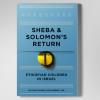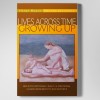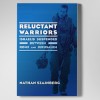After Lives Across Time, my next study was to be of transition to young adulthood among elite Israeli citizen soldiers. I designed this study during Oslo, after Ehud Barak announced that he would decrease the size of the army and the length of service. Also, the kibbutz as an institution was changing, even disappearing; I thought this would be the last opportunity to study its offspring. I designed a study using semi-structured interviews, similar to our US study, looking at 20 men and 20 women raised on kibbutz or moshav.
My first trip to Israel was in Oct 2000, the outbreak of the second Intifada. The first International Conference on Infancy was to be held in Israel; it was cancelled. I went to Israel. I chose to spend the two weeks working in a kibbutz persimmon orchard and begin interviewing soldiers.
My women soldiers kept telling me that I should be talking with their husbands, brothers, and boyfriends. The women enjoyed their two years service, found it fulfilling; but they insisted, I needed to listen to their young men. After several such spontaneous remarks, I changed the study to that of these young men.
Further, during an Intifada, I could not ask these fellows to sit in an office to be videotaped and interviewed for 3-4 hours. They had enough to do without this. And, they wanted to meet with me, interview me; wondered what the heck this American was doing in Israel when the tourists had evaporated. Two prestigious visiting Professorships at Ben Gurion University were unfilled for several years, as invited guests were too afraid to come. Interviews I scheduled were missed because a soldier was called up to reserve duty and in one case, had been wounded in action. In the latter case, when his wife heard that I was on the bus in Samaria traveling to the kibbutz, she invited me for tea and to talk while her husband was in the hospital.
My semi-structured interviews waited and waited. I would have multiple meetings with these fellows, generally over several months, in cafes, or on midnight Jeep security rounds on kibbutz, or in the guardhouse, or in the security station near Jenin, or for 3 1⁄2 hour walk after midnight just before a soldier was to return to duty. Then, I could sit, tape an interview. And afterwards, almost all the soldiers wanted to stay in touch; remembering something significant that they thought I needed to know about childhood; or birth of a child; or to meet the fiancé.
I made twenty-four trips over the next four years.
Here, being an analyst, listening as an analyst, facilitates working across cultures. Bob Bergman (In Szajnberg, 1994) wrote about how being a psychoanalyst and having worked with institutionalized children at the Orthogenic School, taught him to listen better as a physician and later a shaman among the Navajo. One learns about the aesthetic structure of conversation — pace, pause, silence, affective tone — and social signaling described by Erving Goffman — the body posture, the gesture, the gaze and gaze aversion — the signals that can be highly culture-specific and which often arise with affectively-laden subjects, such as talking about one’s inner life. I also turned to my friend and colleague, Paul Eman’s work on facial expression of emotion (and gestural expression). I began to notice how much I attended to face and to body gesture to time my responses (Ekman, 205).
That is, taking a word such as “empathy,” we can begin to parse, explore how it works in technique. Without some consensus on empathy’s nature, one person’s “empathy,” can be another’s intrusiveness, or another’s aloofness. An example of the effect of culture frame of reference comes from anthropology. When Ruth Benedict studied the Navajo, she described them as a quiet people; when decades later a Japanese anthropologist visited, he was struck by the Navajo’s noisiness. To some degree, we could say that a measure of an empathic remark or inquiry is the response (by analysand or research subject): does the person open to richer, more enlightening matters. This is after the fact, the interpretaion or inquiry.
But, how can we judge an interpretation or inquiry or comment on its face, before the person’s response. In the consulting room, how do we weigh what we are about to say, or not say? We can start with Freud’s criteria for a good interpretation: solid content, timing and affect. But, just as Leonard Bernstein articulated five criteria for judging the quality of a musical composition, he added a sixth: does it hit the heart. Therefore, my effectiveness of moving into a culture, of moving into the inner lives of my soldiers, or children, can be assessed by their responses and the reader’s sense of whether something new, enlightening, meaningful is opened. In turn, if you find that these soldiers accounts of their lives is moving and perhaps enlightening, we can look at the techniques for inquiry – techniques that were formed by psychoanalytic work. (Give e.g. of Dud’s interview)
Therefore, when I say that I interviewed Israeli soldiers, I cannot only tell you about the AAI, the anamnesis, and the phenomenology of symptoms. I must also tell you about our psychoanalytic stance of a peculiar listening and speaking and the capacity to maintain a certain empathic neutrality that differentiates us from others — journalists or memoirists, for instance. In addition, like Bob Bergman, working with children — work that involves more action, play, even withstanding aggression– also permits an ability to balance observing with experiencing ego. As analysts, we not only tap our observing egos, but try to facilitate this in the speaker: I found that encouraging the soldier’s self-reflection not only taught me more about my soldiers, but also, brought a sense of self-enlightenment and sincere engagement in our collaborative work. They wanted to talk more, think more, understand more about their lives.
Yet, even this is not a full account of my methodology. You will gather that the soldiers noticed that I was visiting Israel when others were not; that I would meet with them in cafes, kibbutz guard houses at midnight; make Jeep tours of the electrified fence after midnight; travel to their kibbutz in Samaria or their reserve guard duty at the outskirts of Palestinian Jenin. That is, as in child work and even psychoanalytic work, I had to demonstrate that I could enter their worlds, at least to visit. For the psychoanalyst, the counterpart or the complement to a transference neurosis is our willingness to enter at least briefly, at least partially the frightening or the dangerous in the inner worlds of our analysands, and to do so “armed” only with our knowledge and a kind of restrained passion. This willingness, I used to be among these soldiers (Flarsheim, in Giovacchini, 1984)
These soldiers asked questions. Why would I visit, when others don’t, for instance; why am I doing this study. I could answer some questions directly. But other questions I had to defer, such as “What do you think of Jews living in Samaria (or the West Bank)? What have you learned about soldiers?” Here, my honest answer was that I needed to learn more from them, from their fellow soldiers. These soldiers came with a spectrum of political beliefs. In order to sustain dialogue, I kept my political opinions to myself. Nevertheless, when a soldier living in a kibbutz in Judah, asked time to visit him, I did so. This may seem self-evident to those here. But, I also had a close friend, a left-wing supporter of Yossi Beilin, a kibbutznik, who as a matter of ideology, refused to set foot in the “Territories.” This I could not afford to do if I were to hear stories from as many soldiers as possible. My friend’s principles were political; my principle was to learn about transition to young adulthood an inner lives of soldiers; psychoanalytic study is central; politics, I put aside.
Freud cautioned the analyst, be prepared to be surprised.
And, I was prepared to be surprised. I knew I would have information about their early development, about entering the army, peak experiences in the army, in battle, about life afterwards, about attachment. But, on listening again and again to the interviews, reading my notes, I discovered something new about courage that led me to re-read Aristotle’s work and others and to present this to the Chicago Psychoanalytic, with the privilege of a discussion by Jim Fish, whose two sons and now one grandson serve in elite combat units in Israel. Again, this is not the time to tell you about all I learned. But, I can say that these boys had a more demanding definition of courage than I. What I considered courageous on their parts, they dismissed, not only out of their modesty, but also because many of their acts were done out of repeated demanding training. They considered courageous those actions that went beyond training, and always were acts by others, not themselves. I will tell you about Nehemiah Dagan for instance, a now-70-year old former helicopter pilot, who started the helicopter attack force in Israel. (recount saving of downed pilot in Egypt). While he is reluctant to recount this tale, he talks with deep feeling about his son’s courage when he flew the first planes throughout the night to rescue the first group of Ethiopian Jews encamped at the desolate border of Sudan and Ethiopia. This, he insisted, was true courage.
Listening as an analyst includes knowing when not to speak and when speaking, to use Freud’s three criteria for interpretation: what is said, how, and when.
When I speak about these boys, I tell the stories of Dudu, Amit and David below. But their full stories need to be told, not simply read.
(Story of Dudu: realization that he lives three, not two lives, including life of father’s buddy, Dudu.
Riding in night jeep patrol on kibbutz; speaker becoming so involved, he looks at me as drives.
After midnight walk with David, to hear about buddy getting raked by machine gun fire and saving his life. He swivels about hearing someone behind us walking, reaches for gun in small of back and explains he leaves them at home because of this.)



